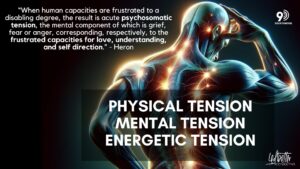
Emotions and Hormones
Emotions and unresolved trauma aren’t just “in your head.” They directly alter hormonal signaling. This explains why perimenopausal women often feel mood symptoms are magnified—their nervous system is already sensitized, and hormonal shifts amplify the effects. Healing the emotional body helps restore endocrine balance.
Our emotions directly influence hormone regulation. When the brain perceives stress, it activates the hypothalamic-pituitary-adrenal (HPA) axis, releasing cortisol. Cortisol is designed for short bursts of survival—but when emotions like fear, anxiety, or unresolved trauma stay active, cortisol remains elevated. Over time, this dysregulation disrupts normal hormonal rhythms.
Trauma, Stress, and the Body
In The Body Keeps the Score, Bessel van der Kolk explains how trauma “lives” in the body, changing how our nervous and endocrine systems respond. Chronic emotional activation can blunt serotonin and dopamine signaling (neurotransmitters linked to mood stability and motivation) and create an overactive stress response. This imbalance pulls on female sex hormones—estrogen and progesterone—leading to mood swings, irregular cycles, worsened PMS, and intensified perimenopausal symptoms.
Female Hormone Interactions
•Cortisol: When chronically high, it steals from progesterone production (sometimes called “pregnenolone steal”), worsening anxiety, insomnia, and hot flashes in perimenopause.
•Serotonin: Often dips with prolonged stress and low estrogen; this contributes to irritability, sadness, and sleep disturbances.
•Estrogen & Progesterone: Both interact with neurotransmitters like serotonin and GABA. Emotional instability can worsen when these hormones are already fluctuating in perimenopause.
So how do we begin to fix the issue?
Restoring Balance: Healing Emotions and Hormones
The good news is that the body and brain are designed for healing. Even when emotions and hormones feel out of sync, you can restore balance with intentional practices. At Ledbetter, we use evidence-based and spirit-led tools that calm the nervous system, rebalance hormones, and create space for true healing.
1. Breathwork for Nervous System Reset
Breathwork activates the parasympathetic nervous system, lowering cortisol and helping the body switch out of “fight-or-flight.” As cortisol steadies, the body can naturally recalibrate estrogen and progesterone levels. Women in perimenopause often notice fewer hot flashes, less anxiety, and improved sleep when breathwork becomes a regular rhythm.
2. Sound & Frequency Therapy
Trauma leaves an imprint in the body’s tissues and biofield. Sound frequencies help retune the nervous system, lowering stress hormones while boosting serotonin and dopamine. This balance directly supports mood, energy, and hormone regulation.
3. Functional Health Support
By addressing root causes of hormone imbalance—like gut health, inflammation, and detox pathways—we help the body metabolize hormones properly. Natural cannabinoid therapies (like CBD, CBG, and CBDA) reduce inflammation, ease anxiety, and support the endocannabinoid system, which is closely tied to hormonal regulation.
4. Trauma Release & Subconscious Healing
The body keeps score of unresolved pain. Our psychosomatic and subconscious therapies gently release stored trauma, which lowers the emotional “load” on the endocrine system. As emotional stability is restored, hormones follow suit.
5. Decreasing Toxic Load for Hormone Balance
Your liver and detox pathways play a huge role in how hormones are broken down and recycled in the body. When toxins from food, beauty products, cleaning supplies, plastics, and the environment build up, they compete with natural hormones and create “endocrine disruption.” This overload makes it harder for estrogen and progesterone to stay in healthy balance, especially during perimenopause when your body is already shifting.
We help you lower this toxic burden by:
•Home & Beauty Detox: Swapping harmful everyday products for safe, effective, non-toxic alternatives.
•Functional Detox Protocols: Gentle, supportive strategies to clear the liver, gut, and lymphatic system so hormones metabolize correctly.
•Cannabinoid & Plant-Based Support: Targeted natural therapies that reduce inflammation and protect hormone receptors from oxidative stress.
When the body isn’t fighting through toxins, it can prioritize balance, repair, and healthy hormone signaling.
Bottom line:
When emotions drive hormone chaos, healing must address both the body and the spirit. By combining nervous system regulation, functional health, trauma release, and faith-based practices, you can step back into balance—experiencing stability, clarity, and peace even in seasons like perimenopause.





